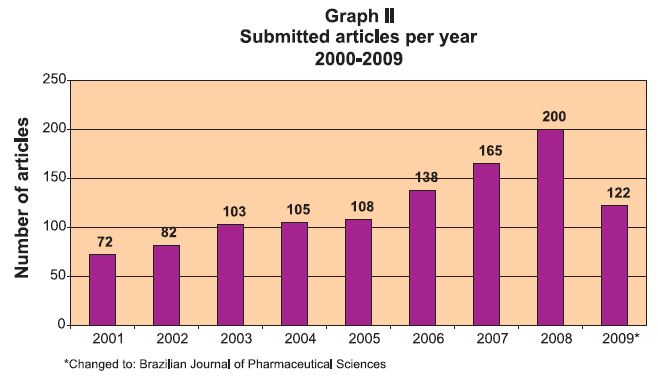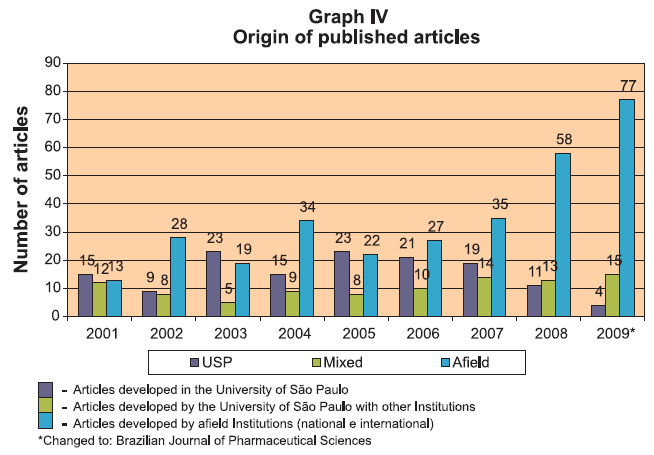EDITORIAL
National publications and the BJPS: the future in our hands!
"We are the memory we have
And the responsibility we assume.
Without memory we do not exist,
Without responsibility
Maybe we do not deserve to exist"
J. Saramago
After reading this remarkable thought of so a distinguished Portuguese writer, José Saramago, the reader may question the reason for this "illustration". Indeed, thinking about the moment of our publication, currently Brazilian Journal of Pharmaceutical Sciences, it can be highly appropriate.
In 2009 we cellebrated the 70th anniversary of the publication. So much history, so many characters! With this past memory alive we have assumed the responsibillities of the present while in search for the future improvement.
If in 2008 we thought about being right in our decisions (Aranha, 2008), in 2009, believing in the change we took the plunge and broke the language barrier. Nowadays, writing about the new phase of the publication's history, we are experiencing the second year of English as the official language of our journal. Have we discarded our nationality with this decision? The answer is no. On the contrary, assuming English as the oficial language ironically means to stand up for "our science" and turn it into more visible around the world. This was, and it is, our goal - to break the barriers of communication. This has not been an easy task towards our editorial process, in both the search for good professionals for reviewing and adequating the specialized terminology and in the search for funds to support those actions. Thanks to our insertion in SciELO, a national database, presently expanded throughout Latin America, which we defend and are proud of, we have now the availability of bibliometric indeces which allow the publication performance analysis. With those statistical data, the evolution of our visibility can be evaluated. In 2009, the increase of confirmed citation, comparatively to the previous number, was registered. This scenario can be depicted in Graph I, in which the number of citations from 2002 to 2009 is presented allowing us to evaluate the growth mentioned before. Other information which can be figured from those data is that concerning the paper accesses or downloads. The previous Revista Brasileira de Ciências Farmacêuticas had 1.420.316 paper accesses during its edition and inclusion in SciELO data base, while the further Brazilian Journal of Pharmaceutical Sciences presents 42.500 accesses, from its inclusion in the same base, in 2009. This shows a growth tendency higher than that observed before (Table I). That information leads us to the conclusion that our decision about the change of language was right. Let's then cellebrate!
Nevertheless, to estimulate the Academy responsible for the development of Brazilian science to search for the advance of national indexed journals as effective ways of divulgating its reasearch which aims to be internationally recognized is our challenge. It is necessary to support them, despite the criticism on the question of quantity versus quality; the present and questionable processes of scientific productivity evaluation and the concern about the concourse performance. Besides, it is necessary to recognize the importance of using the English language in the science divulgation.
Being aware of the risks of changing our editorial policy, we confirmed the decrease in the number of manuscripts submitted for publication in the BJPS, as expected (Graph II). This reflects a cultural aspect which deserves to be reviewed although it takes time to be changed.
We insist on the question about the credibility the scientific community must give to BJPS, expressively widening its visibility. This fact, in addition to the efforts editors and colaborators have made, means to overcome the inferiority complex that we have been facing in national scientific journals, as also pointed out by Torresi et al. (2010) and Salinas (2010).
Although the number of manuscripts submitted for publication has decreased, the increasing of published papers has fortunately been mantained (Graph III). This fact has led to the increase in the received and confirmed citations, as we have been able to maintain the yearly average.
Other important evidence is that related to the BJPS paper accesses from September, 2009, to June, 2010. This fact leads us to believe that the journal multidisciplinary characteristic has been mantained; among the most accessed papers, many areas have been represented: Drugs and Medicines, Food and Nutrition, Pharmaceutical Attention and Pharmaceutical Care, Pharmacognosy and Cosmetics. It is also worth emphasizing that Editorials are among those papers. Those facts keep our purposes well defined. In addition, the interest of authors from abroad and of those from Brazilian states other than São Paulo has been increased. This implies BJPS visibility became wider in the national and international scenarios (Graph IV). Those data certainly put contradict miths and show us the ways to follow.
New goals arise and must be achieved, such as the necessity to increase BJPS in the Pharmaceutical Sciences worldwide; the publication of special and theme numbers, with the participation of foreign authors; the peer-review system improvement, giving more agility to the publication process, besides other initiatives. We have the responsibility to implement them all, although the expertise of some other editors must not be discharded as they faced the same problems in the past, which can not be out of our future debates. Torresi and colleagues (2010), editors of the well-known Quimica Nova, Professor Jailson B. de Andrade, Journal of Brazilian Chemical Society's editor and Professor Silvio R. A. Salinas, member of the Brazilian Society of Physics, published some notes in the respective journals/society stressing the little knowledge of Brazilian researchers about the national scientific journals. They pointed out the question of licensing the national scientific periodicals to international conglomerates with the purpose of incresasing their international insertion, emphasizing the risks to the free access, which compromises the science democratization. Following those scientists and editors, we must highlight the importance of SciELO data base, a successful initiative, internationally recognized (Gerves, 2009), and agree with the chemists who defend that "the extension and international extension of ScieLO clearly show its succeess, which goes against the economic power of some big international companies because of the high fees they request for a paper" (Torresi et al., 2010).
If in the beginning of those Editorial questions as nationality, reponsability and commitment were highlighted, we must now defend the national scientific journals. We hope they can keep free access and represent, at least partially, the national scientific production; they deserve special attention from the financial agencies and massive investment from the editors in the quality of their journals. All those factors are meaningless without the colaboration of the scientific comunity towards the advance of those publications. Yes, the future is in our hands!
I thank Professor Elizabeth Igne Ferreira, Scientific Editor of BJPS, for the opportunity to write this Editorial once again. By presenting our experiences, challenges and worries, we hope to have contributed towards the important reflection about our great responsibility.
Leila R. de Carvalho Aranha
Executive Editor
Brazilian Journal of Pharmaceutical Sciences
- ARANHA, L. R. C. Reflexão para novas decisões. Rev. Bras. Cienc. Farm, v.44, n.2, 2008.
- GERVES, W. Globalizing science publishing. Editorial. Science, v.325, p.920, 2009.
- SALINAS, S. R. A. Associação entre a Springer e o Brazilian Journal of Physics. Boletin SBF, n.1, 2010. Available at: <http://www.sbf1.sbfisica.org.br/boletim1/msg201.htm>. Accessed on: 16 jun. 2010.
- TORRESI, S. I. C.; PARDINI, V. L.; FERREIRA, V. F.; ANDRADE, J. B. Há futuro para as revistas das sociedades científicas? Quim. Nova, v.33, n.2, p.243, 2010.
Publication Dates
-
Publication in this collection
17 Aug 2010 -
Date of issue
June 2010






